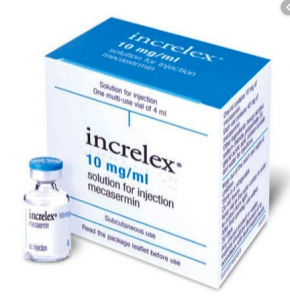Mecasermin is a recombinant human insulin-like growth factor 1 (rh-IGF-1). It is indicated for the long-term treatment of growth failure in children and adolescents aged 2–18 years with confirmed severe primary insulin-like growth factor 1 deficiency (primary IGFD). The recommended maximum dose is 0.12 mg/kg given twice a day.
An EU review identified an increased incidence of benign and malignant tumours in patients receiving mecasermin in the post-marketing setting compared with the background incidence in this patient population.
These cases represented a variety of different malignancies and included rare cancers not usually seen in children. Most cases occurred in patients treated outside the authorised indication or exceeding the maximum dose, however some were reported within the authorised indication and posology for mecasermin.
Current knowledge of IGF-1 biology suggests that IGF-1 may play a role in malignancies within all organs and tissues. The role of the IGF family in the genesis of human benign and malignant neoplasia has been observed in several epidemiological and pre-clinical studies.
Update from MHRA:
Mecasermin is already contraindicated in active or suspected neoplasia. Following the review, the contraindication will be expanded to children or adolescents with any condition or medical history that increases the risk of benign or malignant neoplasia and this will be added into the product information.
In rare situations where a physician considers that that there is a special clinical need to use mecasermin outside of the licensed indication or recommended posology, then this decision should be made in consultation with the patient and caregivers after they have been fully informed of the potential benefits and risks. Physicians should be particularly vigilant for any potential malignancies in these situations.

Leave a Reply